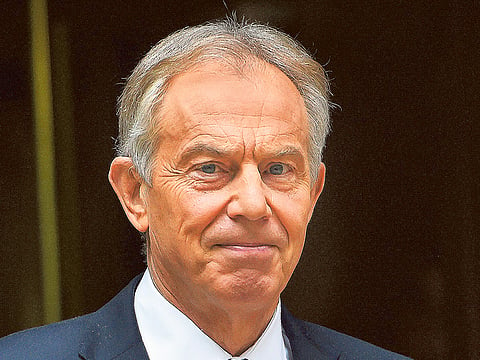Tony Blair awaits fate over UK’s role in Iraq War
Ex-PM could face war crimes charges once Chilcot Report is finally published

London: Former Prime Minister Tony Blair and other senior officials are preparing themselves for the ‘absolutely brutal’ criticism they will face when the long-awaited Chilcot Report into the UK’s involvement in the Iraq War is finally published this week.
Senior civil servant Sir John Chilcot has been leading the inquiry since it was announced by Gordon Brown in 2009 and, on Wednesday, will release his 2.6 million-word account of what happened in the build-up to the 2003 invasion of Iraq, the military action itself and its chaotic aftermath.
The inquiry panel reviewed 150,000 documents and heard testimony from more than 150 witnesses — including Blair, former foreign secretary Jack Straw and ex-MI6 head Sir Richard Dearlove.
The revelations are likely to be explosive, with the report set to ‘damage the reputations’ of many high-ranking officials and possibly even pave the way for war crimes charges to be brought against the likes of Blair, the Labour PM between 1997 and 2007, who ensured Britain played a key role in the US-led coalition that invaded Iraq to topple Saddam Hussein. The justifaction for going to war — that Hussein had weapons of mass destruction (WMDs), which could be deployed within 45 minutes of an order being given — proved to be entirely false.
A source close to the inquiry last week revealed that the report will be damning for some of the key decision makers, particularly Straw. “It will be absolutely brutal for Straw,” the source told the Sunday Times. “The build-up to war is very crucial. It will damage the reputations of a number of people, Richard Dearlove as well as Tony Blair and others.
“But there is a second half. The report will say that we really did make a mess of the aftermath. We sent in inexperienced people. People were put in positions where they couldn’t succeed. We didn’t quite know what we were doing. After the invasion we found it very much more difficult than we had expected.
“All the things the British had been saying about how much better we were at dealing with post-conflict resolution than the Americans came very badly unstuck.”
Dearlove will face criticism for failing to prevent the government from putting ‘gloss’ on intelligence surrounding the alleged WMDs. The 45-minute claim was key in justifying the need to intervene in Iraq despite widespread mass anti-war protests throughout the country and all over the world. But the ‘dodgy dossier’ that spelt out how much of a threat Hussein posed was later accused of being ‘sexed up’ and was published despite reservations among the intelligence community.
Current Labour leader Jeremy Corbyn is a former chairman of the Stop The War Coalition and voted against military action in 2003. He has said he is convinced the Iraq War was illegal and that anyone who had committed a crime should be put on trial — including Blair.
“If [Blair has] committed a war crime, yes. Everyone who’s committed a war crime should be [charged],” Corbyn said. “I think it was an illegal war, I’m confident about that, indeed [former UN secretary-general] Kofi Annan confirmed it was an illegal war, and therefore he has to explain that. Is he going to be tried for it? I don’t know. Could he be tried for it? Possibly.”
Blair will be allowed to see passages of the report that are critical of him under the Maxwellisation process, but the 63-year-old last week claimed not to have read it, while insisting he is happy for the issues surrounding the Iraq War to be debated.
Asked on the BBC’s Andrew Marr Show whether he would accept Chilcot’s report, Blair responded: “Well it’s hard to say that when I haven’t seen it. Of course, you don’t see the report until it comes out so let’s wait for that, but I think when you go back and look at what was said I don’t think anyone can seriously dispute I was making it clear what my position was.
“The thing that will be important when it does happen is that we then have a full debate and I look forward to participating in that. Make no mistake about that. It is really important we do debate these issues because we’ve got huge problems.”
Blair, who worked as Middle East envoy for the United Nations from 2007 to 2015, has previously admitted mistakes were made both before and after the invasion. Last year, in an interview with CNN, he said: “I can say that I apologise for the fact that the intelligence I received was wrong. I also apologise for some of the mistakes in planning, and certainly, our mistake in our understanding of what would happen once you removed the regime.”
- The writer is a freelance journalist based in the UK
Sign up for the Daily Briefing
Get the latest news and updates straight to your inbox



